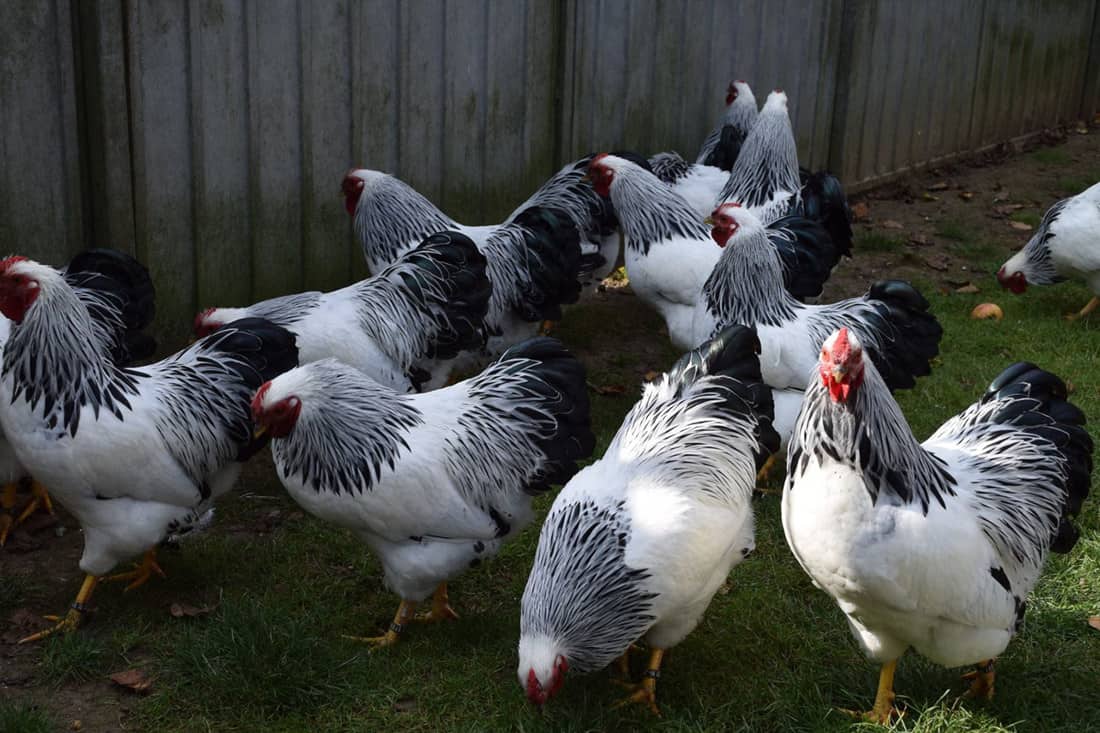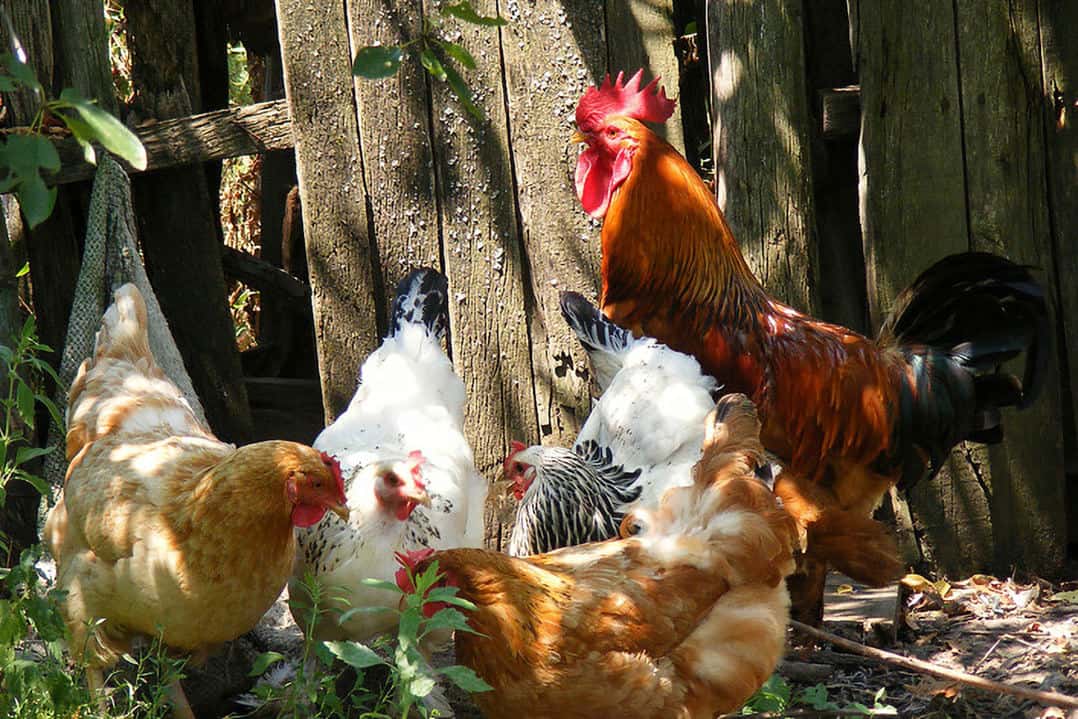Just like humans, chickens make different types of sounds to express their personalities and feelings. Either they’re mating or eating, bathing in the dust or fighting with others, some sounds accompany each activity. Healthy chickens make sounds. However, you have to identify the meaning each conveys to know what’s up with your chickens.
This article will cover
- Common Chicken Sounds And Their Meanings
- Should Chickens Make No Sound At All?
- 6 Ways To Deal With Unnecessary Noise From Your Chickens
- Noisy Chicken Breeds Vs. Quiet Chicken Breeds
5 Common Chicken Sounds And Their Meanings
If you study your chickens well enough, you’ll understand the meaning of each sound. Also, consider the activity to determine what communication goal your chicken is trying to achieve. Below are some common chicken sounds and their meanings.
1. Crowing
Roosters usually crow when it’s dawn; however, hens crow too sometimes. This sound at the breaking of a day means it’s time for everyone to get up and hunt for food. It can also serve as your alarm clock if you’re growing chickens in your backyard. If you have more than one rooster in your brood, get ready to hear different roosters crowing in the morning.
2. Low murmurs
If you hear your chickens murmuring slowly, it usually means they are content. They are well-fed and in the best state of health. They typically do this when they are free-ranging or dust-bathing. They also make this sound to ensure they are within the ear range of one another or whenever they’re enjoying your attention.
3. Danger alert
Chickens alert one another when they sense danger, especially if it’s a predator. Either a hen or rooster can make the sound, but it’s very distinctive. The sound is usually piercing, panicky and elongated if the predator is close to the chickens. It’s one you can’t ignore and when you hear it, rescue your chickens immediately.
4. Parenting
Mother hens make sounds, too as well. They communicate with their chicks before and after hatching. When it’s almost time for the eggs to hatch, the hen starts purring when she’s seated on top of them.
The chicks hear the sound and talk back. The hen responds by encouraging them to break out of their shells. After hatching, the hen also talks to the chicks. You’ll hear some “clucking” sounds during this period. Through this sound, the hen teaches her chicks how to do basic things, warns and guides them, etc.
5. Brooding
Hens tend to be noisy and irritated when they’re brooding. They growl and make several other sounds to show that they want no disturbance from anyone. If anyone gets in their way, they’ll become violent. As such, it’s best to leave brooding hens alone until they’re done brooding.
Should Chickens Make No Sound At All?

Sounds are one of the signs that a chicken is healthy. If your chicken makes no sounds at all, it’s likely there’s something wrong with it. There are no entirely quiet chicken breeds, but every healthy chicken does make some noise. Here are some things to consider when it comes to your chickens making sounds.
Breed
The breed of the chickens usually determines their personalities and expressions. Some chicken breeds are quieter and less disturbing than others. As long as they are well-fed and not in danger, they’ll give you peace. On the other hand, some are naturally loud.
For instance, chicken breeds like Rhode Island Red, Barred Rock Plymouth, etc., are naturally quiet and docile, while species like Malay Roosters, Cornish Chickens, etc., are aggressive. As such, the breed of your chickens determines the amount of noise they make.
Wellbeing
Your chickens’ health also determines the number of sounds your chickens make. For example, if you’re breeding naturally non-aggressive chickens and you ensure they’re well-fed and protected, they won’t make many sounds to the extent of becoming a nuisance.
However, if your chickens are hungry, you can expect that there’ll be no quiet until you give them food. Sometimes, sick chickens also make sounds such as wheezing or heaving sounds. This signals that such chickens need treatment immediately. Therefore, you shouldn’t ignore any sound your chickens make.
Activity
Another thing that determines the types of sounds your chickens make and whether they make any at all is whatever they’re doing at the moment.
If your chickens are enjoying some attention from you, they won’t be as excited as when they’re fighting one another to get a mouthful of treats to munch on. In addition, a chicken who’s sleeping won’t make many sounds like one who’s calling for its mate.
Your goal shouldn’t be to force your chickens to make fewer sounds because it’s biologically right for them to do so. Rather, you should identify the meaning each sounds convey so that you can know if it means your chickens are content and just being themselves or if there’s something you’re not paying attention to.
6 Ways To Deal With Unnecessary Noise From Your Chickens

While you shouldn’t be worried that your chickens make lots of sounds, you can, however, make them quieter if the sounds are disturbing. Below is a guide on how to go about it.
Keep your chickens from danger
Chickens won’t stay quiet when they feel unsafe. They’ll make piercing, elongated sounds that’ll make everyone in the neighborhood wonder what’s up with them. If you don’t want that, get your chickens in a safe place. Ensure there are no predators in sight.
Check the environment for pests, parasites, etc. and exterminate them. Keep your pets away from their cages or nesting boxes if their presence disturbs the chickens. Also, train your pets not to go to your chickens behind your back. Immediately check on your chickens once you hear any alarm.
Provide enough space
Chickens love their personal spaces even though they like being with one another too. They shouldn’t be cooped up in a cage with little or no breathing space. This can make them aggressive and turn on one another.
Start with the number of chickens you can adequately cater for and only expand when you have the resources. Also, provide enough space for your chickens to forage and dust-bathe. These things make them happier and healthier.

Don’t breed roosters
If you’re not looking at breeding chickens for eggs, then you can do without roosters. Roosters make lots of noise; they crow, sound the danger alert, etc. There’s almost no way to keep a rooster quiet except you kill it or if it’s sick. If you want some peace, you can decide not to have roosters in your breed.
Entertain your chickens
Your chickens can start to make a lot of noise when they aren’t doing anything. But if you keep them entertained, they’ll focus more on that and less on noise making. You can engage them by giving them some treats or hanging fruits in their cages to peck at.
Feeding and health
Don’t allow your chickens to go hungry. Food and water must always be available in their cages. Also, treat them regularly. Give them the necessary drugs and raise them in a conducive environment.
Noisy Chicken Breeds Vs. Quiet Chicken Breeds
If you want to homestead, you need to get quiet chicken breeds that won’t scream off their heads and make the neighbors turn their noses at you. All chickens generally make some noise, but some make more noise than others. Here’s a distinction between noisy and quiet chicken breeds.

Top 4 Quiet Chicken Breeds
Bantams
Bantams are small chicken breeds and are well-known for laying eggs. They usually flock together and are great brooders. They naturally have a quiet and docile personality. As long as they are okay, they don’t make any noise.
Barred Rock Plymouths
They are raised for both their eggs and meat. Their eggs are usually brown and large. They have outgoing and friendly personalities but don’t make much noise. They enjoy human attention too.
Mottled Javas
Mottled Javas are one of the species of Java chickens. They are one of the oldest chickens in the world and bred for both their eggs and meat. They like to flock in small groups and are generally shy. So, you can expect that they won’t scream off their heads.
Australorps
These are another set of chickens well-known for their peaceful nature. They are prolific at laying eggs and providing meat. They come in different colors, such as coal-black, blue and white.
Top 4 Noisy chicken breeds
Leghorns
Leghorns are prolific at laying eggs but are very over-reactive. They aren’t suitable for homesteading because of their noise. They can sometimes be stubborn but won’t hesitate to get noisy or excited over anything.
Cornish Chickens
Cornish chickens are naturally loud, aggressive, and cannibalistic. They require a lot of space to raise them and aren’t friendly towards chickens from other breeds.
Malay Roosters
These roosters are raised to be cockfighters; as such, they are naturally aggressive towards everyone. They have no fear of predators and will take on one if necessary. They barely tolerate each other and make a lot of noise.
Polish hens
Polish hens have robust feathers but poor sight. Therefore, they act erratically sometimes and unnecessarily noisy. Compared to other chicken breeds, they are almost never quiet.
Summary
Chickens have different feelings at different moments, and they mostly express them through sounds. There is a sound for every emotion or action. Therefore, you must know the various sounds your chickens make and the meanings associated with them. It’ll not only make it easier to monitor their health, but also serve as a means of entertainment for you.


Joseph Hudson has been raising chickens for over 15 years. In 2018, he completed the Agriculture & Natural Resources program at Mt. San Antonio College. He currently raises over 1400 chickens on his 7.5-hectare farm. He keeps sharing his experience on raising healthy and happy chickens on Chicken Scratch The Foundry.







